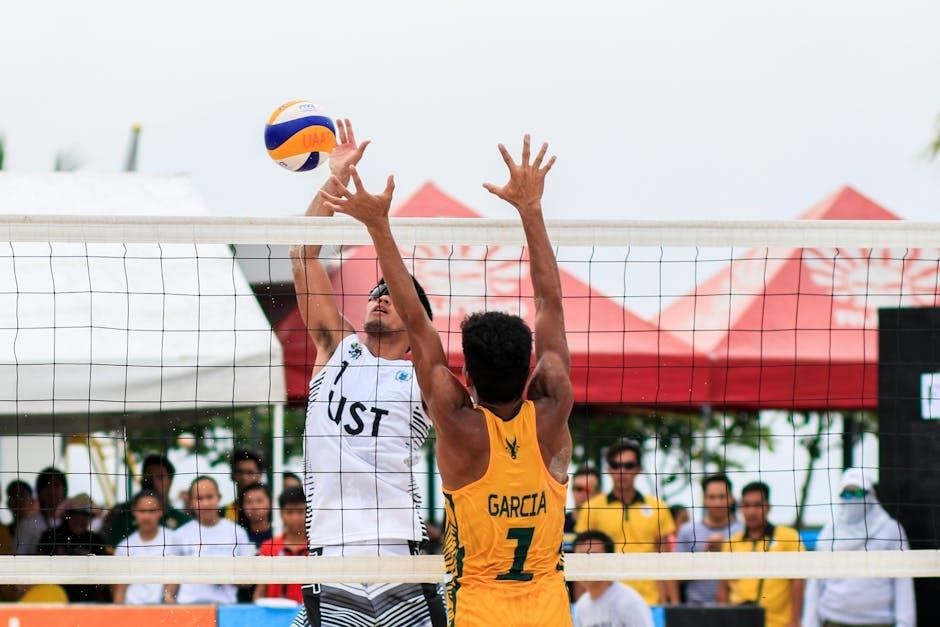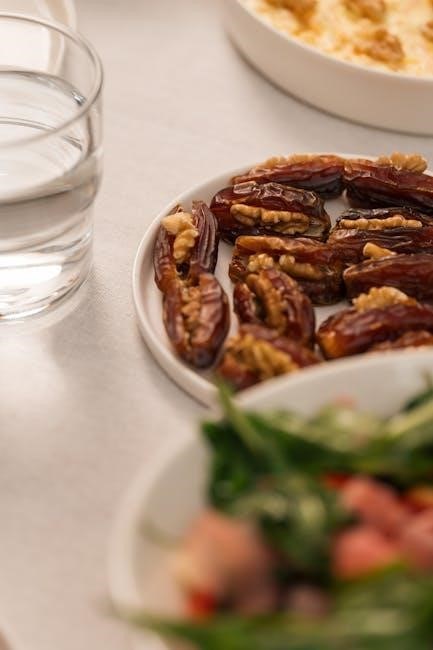A well-structured 7-day meal plan is essential for athletes to fuel performance, optimize recovery, and enhance overall athletic capabilities through balanced nutrition․
1․1 Importance of Balanced Nutrition for Athletes
For athletes, balanced nutrition is crucial to sustain energy levels, enhance performance, and aid in recovery․ A well-balanced diet ensures adequate intake of proteins, carbohydrates, and fats, which fuel workouts and support muscle repair․ Proper nutrition also helps maintain hydration and electrolyte balance, preventing fatigue and optimizing physical output․ By prioritizing nutrient-dense meals, athletes can improve endurance, strength, and overall athletic performance, making balanced nutrition a cornerstone of their training regimen․
1․2 Key Macronutrients: Proteins, Carbohydrates, and Fats
Proteins, carbohydrates, and fats are essential macronutrients for athletes, each serving unique roles․ Proteins build and repair muscles, while carbohydrates provide energy for workouts․ Fats support hormone production and overall health․ Balancing these nutrients ensures sustained energy, optimal recovery, and peak performance, making them the foundation of an athlete’s diet․ Proper intake of these macronutrients helps athletes meet their training demands and achieve their goals effectively․
1․3 Hydration and Electrolyte Balance
Hydration is critical for athletes, as water loss through sweat can impair performance and recovery․ Electrolytes, such as sodium and potassium, regulate fluid balance and nerve function․ Athletes should drink 6-8 glasses of fluid daily, adjusting for sweat loss․ Incorporating electrolyte-rich foods or supplements ensures proper hydration and prevents cramps or fatigue․ Monitoring urine color can help gauge hydration levels, with pale yellow indicating optimal balance․ Proper hydration and electrolyte management are vital for maintaining energy and endurance during training․

Day 1: High-Intensity Training Day
Focus on nutrient-dense meals to fuel high-intensity workouts․ Breakfast provides sustained energy, lunch replenishes glycogen, and dinner supports recovery with lean proteins and omega-3 rich foods․
2․1 Breakfast: Protein-Packed Morning Meal
Start your high-intensity day with a protein-packed breakfast to fuel muscle repair and energy․ Scrambled eggs with whole-grain toast provide sustained energy, while Greek yogurt with berries offers antioxidants and fiber․ A protein smoothie with spinach, banana, and almond milk boosts nutrient intake․ This balanced meal ensures you’re prepared for intense training, supporting both performance and recovery․ Prioritize lean proteins, complex carbs, and healthy fats to maintain energy levels throughout your workout․
2․2 Lunch: Complex Carbohydrates and Lean Protein
Fuel your afternoon with a balanced lunch rich in complex carbs and lean protein․ Grilled chicken breast with quinoa and steamed vegetables provides sustained energy and supports muscle repair․ A whole-grain wrap with turkey, avocado, and spinach offers healthy fats and fiber․ Pair with a side of mixed berries for antioxidants․ This meal combination ensures steady energy levels and aids in recovery, keeping you powered through intense training sessions while maintaining digestive comfort․
2․3 Dinner: Recovery-Focused Meal with Omega-3s
Conclude your day with a recovery-focused dinner rich in omega-3s․ Grilled salmon, a prime source of omega-3 fatty acids, helps reduce inflammation and supports muscle repair․ Pair it with roasted sweet potatoes for complex carbohydrates and steamed asparagus for essential vitamins․ A side of quinoa or brown rice adds whole grains, while a light vinaigrette salad provides additional fiber and antioxidants․ This balanced meal promotes overnight recovery and prepares your body for the next day’s challenges․
Day 2: Endurance Training Day
Focus on sustained energy with complex carbs, lean proteins, and hydration․ Meals are designed to support endurance, reduce fatigue, and enhance stamina for prolonged training sessions․

3․1 Breakfast: Slow-Digesting Carbohydrates
Start with slow-digesting carbs like whole grains, oats, or sweet potatoes to provide sustained energy․ Pair with lean protein and healthy fats, such as eggs or avocado, to maintain steady energy levels․ Include fiber-rich vegetables like spinach or berries for added nutrients․ Avoid sugary foods that cause energy spikes․ Opt for meals like oatmeal with nuts or whole-grain toast with peanut butter․ This breakfast strategy supports endurance and prevents mid-morning fatigue, keeping you fueled throughout training․
3․2 Lunch: Balanced Meal with Whole Grains
Incorporate whole grains like quinoa, brown rice, or whole-grain pasta for sustained energy․ Pair with lean protein sources such as grilled chicken, turkey, or tofu for muscle repair․ Add colorful vegetables like broccoli, bell peppers, or spinach for essential vitamins and fiber․ Include a small portion of healthy fats like avocado or nuts to enhance nutrient absorption․ This balanced meal supports endurance, aids in recovery, and maintains energy levels throughout the day, aligning with the athlete’s high metabolic demands․
3․3 Dinner: High-Protein Meal for Muscle Repair
Focus on high-quality protein sources like grilled chicken, salmon, or plant-based options such as lentils or tofu․ Pair with complex carbohydrates like sweet potatoes or brown rice for sustained energy․ Include fiber-rich vegetables like asparagus, Brussels sprouts, or kale to support digestion and recovery․ Add healthy fats from olive oil or avocado to enhance nutrient absorption․ This meal prioritizes muscle repair, reduces inflammation, and prepares the body for the next day’s endurance training, ensuring optimal recovery and performance․

Day 3: Rest and Recovery Day
4․1 Breakfast: Light and Nutrient-Rich Meal
Start your rest day with a gentle, yet nourishing breakfast․ Opt for whole-grain toast topped with avocado and a poached egg, alongside a side of fresh berries․ This meal provides healthy fats, fiber, and essential vitamins to support digestion and energy without overexertion․ Incorporating a glass of freshly squeezed orange juice can also boost vitamin C intake, aiding in immune function and muscle recovery․ Keep portions moderate to avoid digestive stress during your recovery phase․
4․2 Lunch: Anti-Inflammatory Foods
Fuel your recovery with a lunch rich in anti-inflammatory foods․ Grilled chicken breast, quinoa, and steamed vegetables like spinach and turmeric-infused carrots make an ideal combination․ Add a side of mixed berries or a small serving of walnuts for antioxidants and omega-3 fatty acids․ Incorporate a light vinaigrette dressing on a fresh greens salad to enhance nutrient absorption․ Stay hydrated with herbal tea or coconut water to replenish electrolytes․ This meal supports muscle repair and reduces inflammation, aiding in faster recovery․
4․3 Dinner: Low-Intensity, Balanced Meal
Conclude your rest day with a balanced, low-intensity dinner․ Opt for grilled salmon, roasted sweet potatoes, and steamed green beans․ Salmon provides omega-3s for inflammation reduction, while sweet potatoes offer sustained energy and fiber․ Pair with a side of mixed greens tossed in olive oil and lemon juice․ Ensure hydration with herbal tea or water․ This meal supports gentle digestion and recovery, preparing your body for the next day’s activities without overexertion․

Day 4: Strength Training Day
Fuel your strength training with a balanced intake of protein, complex carbs, and healthy fats․ Include meals like oatmeal with nuts for breakfast, grilled chicken with quinoa for lunch, and a hearty beef stir-fry for dinner to support muscle repair and energy needs․
5․1 Breakfast: Pre-Workout Meal for Energy
Start your strength training day with a nutrient-dense breakfast․ Opt for oatmeal topped with nuts and seeds for sustained energy․ Include scrambled eggs or a protein smoothie for muscle support․ Pair with whole-grain toast and fresh fruit for a boost of vitamins and minerals․ Avoid heavy or greasy foods to prevent digestive discomfort during workouts․ Hydrate with water or a sports drink to ensure optimal performance․
5․2 Lunch: Post-Workout Recovery Meal
After strength training, focus on a meal rich in protein and carbohydrates to aid muscle recovery․ Include grilled chicken, quinoa, and steamed vegetables for a balanced mix of nutrients․ Incorporate healthy fats like avocado or nuts to support energy replenishment․ Ensure hydration by drinking water or electrolyte-rich beverages like coconut water․ Aim for a meal that is easily digestible to avoid discomfort and promote efficient recovery․
5․3 Dinner: Muscle-Building Meal with Quality Protein
Focus on lean proteins like grilled chicken, fish, or lean beef to support muscle synthesis․ Pair with complex carbohydrates such as sweet potatoes or brown rice for sustained energy․ Include fiber-rich vegetables like broccoli or spinach for digestion․ Add healthy fats like avocado or nuts to enhance hormone production and reduce inflammation․ Ensure the meal is balanced, with a macronutrient breakdown that prioritizes protein and carbs for recovery․ Stay hydrated with water or herbal tea to support overall muscle function and repair․

Day 5: High-Intensity Interval Training (HIIT)
Focus on quick energy sources and recovery․ Include complex carbs for sustained power, lean proteins for muscle repair, and electrolytes for hydration․ Balanced meals support peak performance․
6․1 Breakfast: Quick Energy Sources
Start with a nutrient-dense breakfast to fuel HIIT sessions․ Oatmeal with peanut butter, banana slices, and a splash of low-fat milk provides sustained energy․ Include scrambled eggs for protein and whole-grain toast for complex carbs․ Add a handful of berries for antioxidants․ Hydrate with coconut water or orange juice for electrolytes․ This meal balances macronutrients, ensuring rapid energy release and muscle support during intense workouts․ Portion sizes can be adjusted based on individual caloric needs․
6․2 Lunch: Balanced Meal for Sustained Energy
Opt for a balanced lunch featuring quinoa, grilled chicken breast, and colorful vegetables like bell peppers and broccoli․ Add a drizzle of olive oil for healthy fats and a side of mixed berries for antioxidants․ Incorporate a small serving of whole-grain crackers for sustained energy․ Stay hydrated with coconut water or herbal tea to replenish electrolytes․ This meal provides a mix of complex carbs, lean protein, and fiber, supporting energy levels throughout the day while aiding muscle recovery․
6․3 Dinner: Recovery Meal with Antioxidants

Conclude the day with a recovery-focused dinner featuring grilled salmon, roasted sweet potatoes, and steamed spinach․ Salmon provides omega-3 fatty acids to reduce inflammation, while sweet potatoes offer complex carbohydrates for energy replenishment․ Add a side of mixed berries with a citrus vinaigrette for a boost of antioxidants․ Pair with green tea for additional anti-inflammatory benefits․ This meal supports muscle repair, replenishes glycogen stores, and promotes overall recovery after an intense HIIT session․

Day 6: Endurance and Stamina Day
Focus on meals rich in complex carbs, lean proteins, and healthy fats to support prolonged activities․ This day emphasizes hydration and electrolyte-rich foods to maintain stamina․
7․1 Breakfast: Long-Lasting Energy Meal
Start with oatmeal topped with fresh berries, nuts, and a drizzle of honey for sustained energy․ Include scrambled eggs or Greek yogurt for protein․ Add whole-grain toast or avocado for healthy fats․ A protein smoothie with spinach, banana, and almond milk is another option․ Pair with a hydration pack containing coconut water and electrolytes to replenish fluids lost during endurance activities․ Adjust portion sizes based on caloric needs to ensure adequate fuel for prolonged efforts․
7․2 Lunch: Hydration and Electrolyte-Rich Foods
Focus on a balanced lunch with hydrating ingredients like watermelon, cucumbers, and oranges․ Include grilled chicken breast or fish for lean protein, paired with quinoa or brown rice․ Add steamed spinach and bell peppers for essential vitamins․ Incorporate coconut water or an electrolyte-rich drink to replenish lost salts․ A side of mixed nuts provides healthy fats․ Ensure portion sizes align with caloric needs to maintain energy levels throughout endurance training․ Pair with herbal tea for added hydration benefits․
7․3 Dinner: Balanced Meal for Overnight Recovery
Opt for grilled salmon with omega-3s to reduce inflammation and support muscle repair․ Pair with roasted sweet potatoes for sustained energy and steamed broccoli for vitamins․ A side of Greek yogurt with berries provides probiotics and antioxidants․ Ensure hydration with herbal tea․ This meal balances protein, complex carbs, and healthy fats, aiding in overnight recovery and preparing the body for the next day’s endurance training․ Adjust portion sizes based on caloric needs to maintain optimal energy levels․
Day 7: Active Recovery Day
Focus on light activities and nutrient-rich meals to support recovery․ Include lean proteins, whole grains, and antioxidant-rich foods to promote healing and prepare for the week ahead․
8․1 Breakfast: Gentle Digestion Meal
Start with a soothing meal like oatmeal topped with berries and chia seeds․ Pair with scrambled eggs or tofu for protein․ Include a banana or avocado for healthy fats․ Herbal tea or coconut water supports hydration․ This meal is easy on the stomach, providing sustained energy without overloading the digestive system, perfect for active recovery days․
8․2 Lunch: Light and Refreshing Meal
Opt for a grilled chicken salad with mixed greens, cherry tomatoes, cucumber, and a light vinaigrette․ Pair with a small side of quinoa or brown rice for complex carbs․ Include a Greek yogurt parfait with berries and granola for probiotics and antioxidants․ Stay hydrated with herbal tea or coconut water․ This meal is designed to be easy on the stomach while providing essential nutrients for energy and recovery during active recovery days․
8․3 Dinner: Final Recovery Meal
Conclude the day with a balanced meal featuring grilled turkey breast, roasted sweet potatoes, and steamed broccoli․ Add a side of mixed berries with Greek yogurt for antioxidants and natural sugars․ Incorporate a small portion of healthy fats like avocado or olive oil to support recovery․ Pair with a glass of herbal tea or water with electrolytes to replenish fluids․ This meal ensures sustained energy and aids in muscle repair, wrapping up the week on a nourishing note․

Additional Tips for Customization
Customize portion sizes based on caloric needs and activity levels․ Incorporate supplements like protein powder for convenience and recovery․ Plan meals in advance for consistency․
9․1 Adjusting Portion Sizes Based on Caloric Needs
Adjusting portion sizes is crucial to meet individual caloric needs, ensuring optimal energy levels and recovery․ Athletes requiring more calories can increase protein, carbohydrates, and healthy fats․ For example, adding an extra serving of lean protein or complex carbs to meals․ Conversely, those needing fewer calories can reduce portion sizes while maintaining nutrient density․ Consistency and tracking are key to achieving specific goals, whether it’s weight management, muscle gain, or enhanced performance․ Tailor portions based on training intensity and personal goals․
9․2 Incorporating Supplements for Performance
Supplements can enhance an athlete’s diet by addressing nutritional gaps and boosting performance․ Key options include protein powder for muscle repair, creatine for strength, and BCAAs for endurance․ Electrolytes and hydration supplements are vital for replenishing lost salts during intense workouts․ Always choose high-quality products and consult a sports nutritionist to ensure safe and effective use․ Tailor supplements to specific training goals, such as recovery, muscle growth, or energy optimization, to maximize their benefits without overloading the system․
9․3 Meal Prep and Grocery List
Meal prep is crucial for athletes to maintain consistency and meet nutritional demands․ A structured grocery list ensures all necessary ingredients are available, preventing last-minute, unhealthy choices․ Plan meals for the week, purchase ingredients in bulk, and organize shopping to save time and reduce waste․ Adjust the list based on personal preferences and dietary needs to keep meals varied and engaging throughout the training cycle․
A well-executed 7-day meal plan is vital for athletes to achieve peak performance and recovery․ Consistency and proper nutrition are key to unlocking their full potential and success․

10․1 Importance of Consistency
Consistency in following a 7-day meal plan is crucial for athletes to maintain energy levels, support muscle repair, and optimize performance․ It ensures a steady supply of nutrients, prevents deficiencies, and aligns with training goals, fostering long-term success and peak physical condition․
10․2 Final Thoughts on Nutrition for Athletes
Nutrition is the foundation of athletic success, directly influencing performance, recovery, and overall health․ A balanced intake of proteins, carbohydrates, and fats, along with proper hydration, is essential for fueling workouts and repairing tissues․ Customizing the meal plan to individual needs ensures optimal results, while consistency and professional guidance further enhance its effectiveness․ Prioritizing nutrition as a long-term investment in athletic goals fosters resilience, peak performance, and sustained success․
